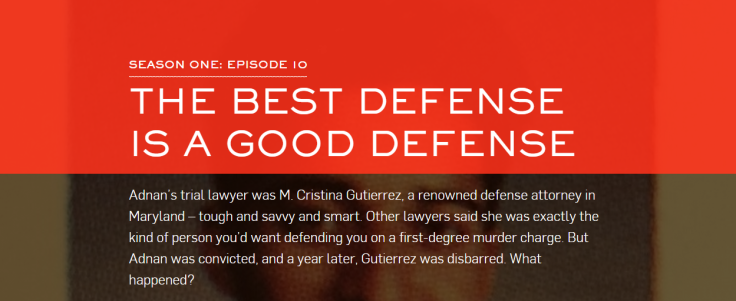'Serial' Podcast Episode 10 Recap: Cristina Gutierrez And 'The Best Defense Is A Good Defense'

"Serial" episode 10, "The Best Defense Is a Good Defense," refocuses the attention on Adnan Syed's lawyer, M. Cristina Gutierrez. Adnan was convicted in 2000 of murdering his 18-year-old ex-girlfriend, Hae Min Lee, and narrator Sarah Koenig takes a look at what happened in the trial, which led the jury to find him guilty.
Thursday's episode starts off with a look at the city of Baltimore, and the jury selection process. Koenig estimates that half of the potential jurors said they were either victims, convicted, served time or had time pending for criminal activity. The judge was looking for prejudice, which would have prohibited a juror from viewing the case objectively.
While there was no overt prejudice, Adnan's mother, Shamim Rahman, believes the family was discriminated against because they are Muslim. She calls her son's conviction a "continuous torture," and said Adnan, who is now 34, was "easy to target." In an example of how two radically different conclusions can be drawn from a single moment, the Muslim community's support of Adnan was viewed either as a way to ensure Adnan would follow the right path or lay his escape route to Pakistan.
The Muslim community raised thousands of dollars to help fund Adnan's defense and would pack the courtroom each day during the appeal hearing. Prosecutors argued that the community would allow Adnan to escape to Pakistan, citing another case in Chicago in which a Pakistani male killed his ex-girlfriend and fled the country. One of the prosecutors would later issue an apology to the judge, noting her presentation of expert testimony from Harry Marshall of the Justice Department may have been misconstrued and the Chicago case was completely different and bore zero similarity to Adnan's case.
Koenig next examines how Muslim culture was portrayed during the trial. A harsh cultural upbringing, women treated as second-class citizens, men control women, are all mentioned and frames the notion that Adnan killed Hae because his honor was "besmirched."
All of this informs how the jury may have been thinking at the time of the trial and Gutierrez has to build a case that completely clears Adnan of any guilt or introduces enough reasonable doubt to not convict him. Adnan seems to trust Gutierrez and believes she did everything she could to defend him, but Koenig notes some disturbing patterns later on which could have affected her performance.
Gutierrez tried to place guilt on Jay and the mysterious Mr. S. The first trial ended in mistrial after the judge said Gutierrez was lying about not seeing the cell phone records and she soon asked for a motion for mistrial, which was granted by the judge. There's also that great part where the prosecutor said Gutierrez called her co-counsel an "a--hole."
Gutierrez had a similar strategy during the second trial, but her delivery is a bit off. She spends five days cross-examining Jay, but it meanders and jurors may not have been able to follow her line of questioning or what she was trying to prove. Another flaw in her strategy was not attacking the timeline based on the cell phone records. A potential victory, the prosecutor in Adnan's case set Jay up with a lawyer for his plea deal, for Gutierrez was determined to not have held influence over Jay's testimony.
Gutierrez had a sterling reputation, she was considered tough and worked hard for her clients, but she soon began reportedly acting strange toward the end of Adnan's trial. She reportedly was constantly asking Adnan's family for money but wouldn't pay expert witnesses. That behavior seemed to continue in another case that she was working on at the same time as Adnan. Zach Witman, then 15-years-old, was accused, and later convicted, of murdering his younger brother. Gutierrez was defending Zach, but she was late on filing briefs. She would also allegedly ask for thousands of dollars and didn't pay experts. She was disbarred in 2001 and died in January 2004.
As a reporter for the Baltimore Sun, Koenig covered the complaints against Gutierrez as well as her disbarment. You can read her articles here and here. The Witmans were one of 28 claims paid out by the state.
At the end of the episode, Koenig discusses news of Adnan's appeal, clarifying that the appeal is based on ineffective counsel since Gutierrez never sought a plea deal despite his requests. Koenig ends the latest "Serial" episode by teasing an exploration into Adnan's personality.
© Copyright IBTimes 2024. All rights reserved.












